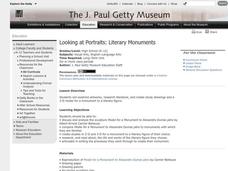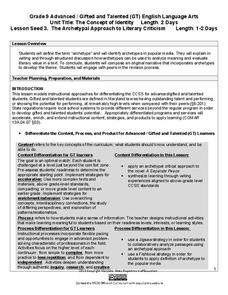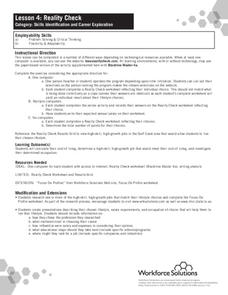Curated OER
Reference Skills
Young scholars participate in an online scavenger hunt using the parts of a book to locate information. In this reference materials instructional activity, students locate the title, subtitle, table of contents and glossary....
Curated OER
Weather the Storm
Fourth graders complete multi-curricular activities for weather. In this weather lesson, 4th graders complete creative writing, research, and weather data analysis activities for the lesson.
Curated OER
Looking at Portraits: Literary Monuments
Examine artwork, research literature, and create art pieces for a monument to a literary figure. Young scholars analyze the sculpture Model for a Monument to Alexandre Dumas père and compare it to other well-known monuments. They...
PBS
Think Like a Historian: A Viewing Guide
Calling all junior detectives! Scholars use the tools of investigation to determine the causes and impacts of the American Civil War. Using viewing guides, videos, group research, and written resources, they discover what it takes to...
Maryland Department of Education
The Concept of Identity Lesson 3: The Archetypal Approach to Literary Criticism
As class members continue their study of approaches to literary criticism, readers examine the symbolism and archetypal patterns in John Knowles' A Separate Peace, and how these parallels are used to develop a theme...
Workforce Solutions
Reality Check
Talk about a reality check! High schoolers complete a lifestyle survey indicating their preference for housing, entertainment, etc., and then calculate the salary required to support those choices. Finally, they research the types of...
Sea World
Marine Animal Husbandry and Training
Step into the role of a zoo director with several activities about animal training and running a zoo. Kids calculate the amount of food each animal needs, design a habitat for penguins, decide how to breed bottlenose dolphins, and train...
Curated OER
Teaching Julius Caesar: A Differentiated Approach
While the themes of Julius Caesar may appeal to most readers, the act of reading the play can be a challenge. A unit plan related to the popular play by Shakespeare provides lesson plans and activities designed for differentiated...
iCivics
Drafting Board: Military Intervention
Should countries use their militaries to stop humanitarian crises in other countries? Learners make claims, organize their reasoning, and provide evidence for their arguments with this rich resource.
iKeepSafe
The First Amendment, Copyright, and Fair Use
Do I have a right to make a copy? Head off this commonly asked question with this colorful, informative infographic, and promote digital citizenship in your class by directing learners to ask the right questions before...
NASA
Space-Based Astronomy on the Internet
Young scientists compile everything they have learned into a report in the fifth and final lesson in a unit on the visible light spectrum. Access to photos from observatories, telescopes, and satellites allows learners to compare...
EngageNY
Grade 9 ELA Module 3, Unit 3, Lesson 3
Plagiarism is the theft of intellectual property. To avoid this crime, class members learn how to create a works cited page and how to craft in-text citations. After examining a high-performance model paragraph and an example of a works...
Virginia Department of Education
Radioactive Decay and Half-Life
Explain the importance of radioactive half-life as your high school biologists demonstrate the concept by performing a series of steps designed to simulate radioactive decay. Pupils use pennies to perform an experiment and gather data....
Time Warp Trio
See You Later, Gladiator!
Young historians take a look at the age of gladiators, and the cultural atmosphere present when they staged their epic battles. Pupils pretend to be reporters and write newspaper articles about one of the events they stage. Then,...
University of Chicago
Using Artifacts for Clues About Identity
Learn about the ancient Near East through a close examination of ancient artifacts. Lead your class into analysis by first observing an artifact as a class. Pupils can then work in pairs to analyze the other artifacts and compile a list...
Visa
Home Sweet Home: Purchasing a Place
While the process of buying a home can certainly be overwhelming, give your young adults a leg up for their future by introducing them to the components of a mortgage, as well as exploring the basic concept of credit and how to become...
Global Oneness Project
Rethinking the Fabrics We Wear
What are fibersheds and what what do they have to do with environmental protections? A photo essay and audio recordings about Mimi Luebbermann, and her sheep, cause consumers to reflect on how their clothing choices can support local...
PBS
Predicting/Making a Hypothesis
As an introduction to the hypothesis and testing method of investigation, young history detectives engage in a special investigation of a family artifact. After watching a short video that demonstrates the method, they develop a...
Curated OER
Environmental Harmony
Students use information from a variety of media to evaluate different artists' views on the human relationship to nature. From these sources, class discussion, and personal experience, students will synthesize a thoughtful,...
Curated OER
Nibble, Nibble, Little Mouse
Students complete activities to analyze points of view in different texts. In this point of view lesson, students read Hansel and Gretel and The Magic Circle and discuss the points of view. Students choose a character from the story and...
Curated OER
You Can't Judge a Book By Its Cover... But Can You Judge a Book By Its First Line?
In this literature/book analysis worksheet, students read and think about the first sentence of a book which is provided. Based on this first sentence, students answer 6 questions, making predictions about what the book will be like....
Curated OER
Native Cultures and Values
High schoolers learn about Native American culture. In this history and diversity lesson, students use a website to create a timeline of significant events, contributions, growth and developments of Native American culture...
Curated OER
Biography: Telling Someone's Life Story
There are many different ways to help your students get excited about writing biographies.
Curated OER
Everyone is an Author!
Second graders research authors of 2 different writing styles and then write their own piece in the style they choose. In this writing lesson plan, 2nd graders look through many books for love of reading.

























